Reviews and recommendations are unbiased and products are independently selected. Postmedia may earn an affiliate commission from purchases made through links on this page.
Climate change affecting B.C. food supply. What can we do about it?
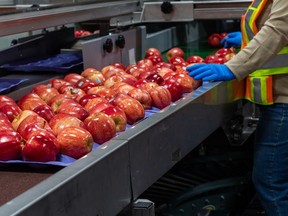
The climate is changing. Our food supplies are being affected. What can we do about it?
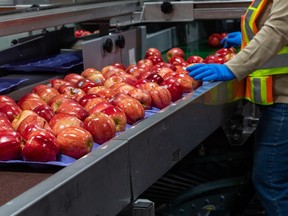
Article content
On just two acres of land in the heart of Kelowna, Myles Ferber raises enough tomatoes, greens and nearly 50 other kinds of produce to feed local restaurants, the farmers’ market and a growing number of direct consumers.
“I like that our model relies on diversity,” says the co-owner of Wise Earth Farm as we walk past beds of microgreens and garlic scapes. “If the weather is not good for something for us, it’s likely good for something else. If it’s too hot for bok choy, it’s likely good for tomatoes.”
Advertisement 2
Article content
It’s that diversity that has protected his family farm during the last few years of disastrous weather events in the Okanagan Valley. That, and the fact that they farm regeneratively, tending the soil with reverence, using good old-fashioned manual labour and some 240 yards of compost a year.
The result, Ferber says, is “a living soil system” that produces the kind of intensely flavourful produce chefs crave.
Market farms like Wise Earth — small, local, diverse, seasonal — will help us keep putting food on the table as our climate continues to change. But, Ferber says: “There’s so little support for small farmers. And there are so many barriers to entry, mainly financial.”
This imbalance is both frustrating and alarming to people who care about our food systems, people like Ned Bell, the chef-ambassador for Buy BC and previously the executive chef for Ocean Wise.
“During these years of struggle, we just need to dig deeper and support our farmers,” Bell says. “Is there a more important thing? Really?”
Less abundance
If there is still any doubt that the climate is changing, the latest reports from organizations like the Intergovernmental Panel on Climate Change and the United Nations Environment Program should put them to rest.
Advertisement 3
Article content
They’ve found that temperatures are rising faster and higher than expected, contributing to drought, storms and wildfires, to rising oceans, swarms of ravenous insects and the spread of disease, which in turn has led to social unrest, conflict and what UN Secretary-General António Guterres has called “an atlas of human suffering.”
All of that affects our food, too.
“Climate impacts harvest full stop,” says Bell. “It impacts fruit trees, it impacts plants, it impacts fisheries. It impacts abundance.”
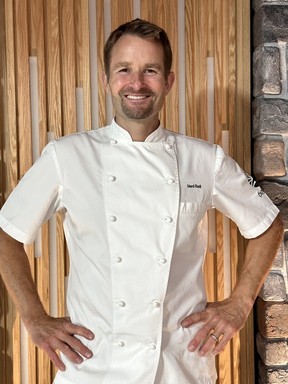
Here in B.C., the last few years have seen record heat along with drier summers, wilder winters and deadly events like the 2021 heat dome that killed more than one billion sea creatures and January’s sudden cold freeze, which wreaked havoc in orchards and vineyards.
“It is constantly a roller-coaster for these farmers and that is very, very difficult,” Bell says.
The impact around the world, though, is even worse. And that means we need to rethink our addiction to cheap imported food, and the mindset that we should be able to eat whatever we want anywhere, at any time.
Article content
Advertisement 4
Article content
Already the climate is lowering yields of everything from maple syrup to chocolate, pine nuts and avocados, and sending prices soaring.
Just a few examples:
• We are facing a dire global shortage of vanilla, thanks mainly to devastating storms around Madagascar, where more than 80 per cent of it is grown.
• Olive oil is also in short supply. Olive trees in the Mediterranean were already suffering from drought and disease when last summer’s heatwave decimated crops by 40 per cent.
• In places like Bangladesh, coastal flooding is making rice fields too salty to grow the grain that more than half of the world’s population relies on.
• The entire coffee sector is at risk as rising temperatures, severe dry spells and extreme, erratic rainfall are driving farmers off their land and out of the industry.
It’s not just the changing climate that’s to blame. In every case, there’s also the impact of human behaviour, whether it’s armed conflict in Ukraine or deforestation in Brazil or the kind of intensive farming practices that are depleting the soil and draining water tables in places like Punjab and Mexico.
Advertisement 5
Article content
All of this makes it more important than ever to grow food here in B.C., and to support the people who do.
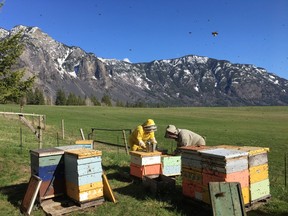
Too hot, too cold, too much
Over in the beautiful Creston Valley, Amanda Goodman Lee should be on top of the world. Earlier this year, she and her husband Jeff Lee, both master beekeepers and the owners of Honey Bee Zen, won Best in Show — among several other awards — at the American Honey Show in New Orleans.
Now when they appear at farmers markets, they’re treated like rock stars, which makes her laugh a little. But there hasn’t been a lot else to laugh about this spring.
“Normally, we’d be coming out of cherry production right now,” Lee says. But thanks to a sudden cold snap in January, when temperatures plunged from 3 C to minus 23 C overnight, the Creston Valley expects 100 per cent loss of this year’s cherry crop.
“The income we get from pollinating was lost, too. There’s no point bringing bees in when you don’t have fruit,” she says. “That’s farming.”
The problem isn’t just one bad winter, though. “My understanding from people with cherries is that they have had five bad years, so I just don’t know how they can stay in business,” she says.
Advertisement 6
Article content
The January freeze was a rare occurrence. The bigger and more persistent problem is the heat, along with fires, smoke and drought.
“It all goes hand in hand. They are a lot of little things that are a big thing now,” Lee says.
Dry conditions mean there isn’t enough moisture available for the bees to create nectar; meanwhile, the smoke from wildfires convinces them they are in danger, so they prepare to leave, turning nectar into wax and reducing their production of honey.
“And with the warm weather going into fall, the bees are not in stasis, so the bees are eating into their stores. You have to make sure they have enough honey—or you have to feed them,” Lee says. “Honeybees are livestock and we have a responsibility to take care of them.”
A good number of bees died in that cold snap, too, though not as many as back in 2018, when the Lees lost 90 per cent of their hives.
“It was devastating. That was a really hard year,” she says. “It made us better beekeepers because it made us pay attention to all the things.”
She adds: “I don’t think you get into farming if you’re not an optimist. I think we’re glass-half-full kind of people.”
Advertisement 7
Article content
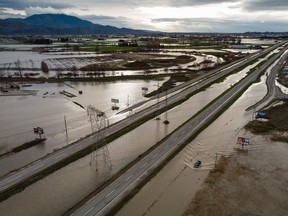
‘Farming is in peril’
For many farmers, though, the glass is looking pretty empty these days.
The number of farms in B.C. has plummeted — down 22 per cent, from 20,290 farms in 2001 to 15,841 in 2021. The amount of farmland has dwindled, too, down by more than 750,000 acres between 2016 and 2021.
Worse, our farmers are aging out of the business. According to the 2021 Census of Agriculture, the average age of B.C.’s farmers is 57.8 years old. Two-thirds of them are over 55. Yet nearly three-quarters of B.C. farms have no succession plan.
As Bell points out, “A lot of farming is in peril.”
He was in Osoyoos in May, when more than 200 fruit growers rallied outside the provincial NDP caucus retreat to ask for help. True, the government had already committed $70 million to help vineyards and orchards replant and adapt to climate change. But that, the farmers say, is nowhere near enough for an industry in crisis.
“Listening to these farmers talk about the dire straits they are in, it’s heartbreaking,” says Bell. “It’s climate change, but it’s many other things. It’s been one thing after the next over the last five years. Farmers are kind of at their wits’ end and they don’t get the support they need.”
Advertisement 8
Article content
He feels the government needs to step up with more money and better programs. But consumers need to step up, too.
He gets that local produce can be expensive and people don’t always have time to hit multiple grocers or meander through a farmers’ market. Even so, he says, “With a little bit of extra effort, you can look for things that are in season and local.
He adds: “I just wish we would spend 20 to 30 per cent more of our dollars on local ingredients because it would make a real difference. Or if people could even do 10 per cent. Small, small percentages can help these farmers.”
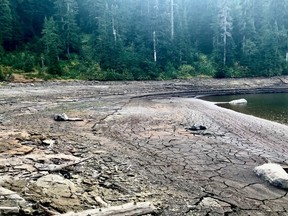
Another dust bowl?
Sometimes it seems like we never learn. Or maybe we just learn the wrong things.
Back in the 1930s, much of American and Canadian prairies, the breadbasket of the world, turned into a dust bowl.
The land was already over-worked and depleted, its deep-rooted natural plant systems replaced by monoculture grain crops. Then temperatures rose. Drought followed. When the winds picked up, the soil simply blew away.
Fast forward less than a century and the soil is again over-worked and depleted. And once again, temperatures are rising and drought is spreading. Only this time, it’s worse, and it’s affecting the whole world.
Advertisement 9
Article content
We are, it seems, a greedy species, always hungry for more, demanding what we want, when we want it and at the cheapest price possible. But in a changing climate, that is no longer sustainable.
We will need to change the way we eat. That means choosing local, eating with the seasons and supporting the people who grow our food.
As Bell says, “I don’t know what the solution is except for having more and more small farmers growing cool things.”
The climate is changing. Our food supplies are being affected. What can we do about it?
Ask a farmer like Ferber or Buy BC chef ambassador Bell, and they will tell you to eat food that is local, seasonal and produced as sustainably as possible. Here are 10 ways to do so.
• Look for local products at your grocery store — even big box supermarkets often have Buy BC sections.
• If your grocer doesn’t carry local products, ask them to do so.
• Shop at farmers markets.
• Have CSA boxes of local veg delivered to your door.
• Grow your own — even just a pot of herbs.
• Eat more plants, and less meat and dairy.
• Find ways to reduce food waste.
• Eat organic when you can.
Advertisement 10
Article content
• Consider reducing your reliance on imported foods, especially those known to have a negative impact on the environment.
• Most of all, support your local farmers.
Recommended from Editorial
Bookmark our website and support our journalism: Don’t miss the news you need to know — add VancouverSun.com and TheProvince.com to your bookmarks and sign up for our newsletters here.
You can also support our journalism by becoming a digital subscriber: For just $14 a month, you can get unlimited access to The Vancouver Sun, The Province, National Post and 13 other Canadian news sites. Support us by subscribing today: The Vancouver Sun | The Province.
Article content
Source: vancouversun.com



